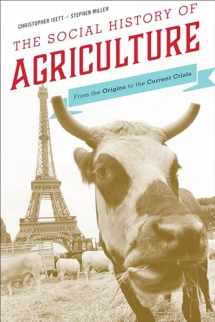
The Social History of Agriculture: From the Origins to the Current Crisis
ISBN-13:
9781442209664
ISBN-10:
1442209666
Author:
Stephen Miller, Christopher Isett
Publication date:
2016
Publisher:
Rowman & Littlefield Publishers
Format:
Hardcover
422 pages
FREE US shipping
Book details
ISBN-13:
9781442209664
ISBN-10:
1442209666
Author:
Stephen Miller, Christopher Isett
Publication date:
2016
Publisher:
Rowman & Littlefield Publishers
Format:
Hardcover
422 pages
Summary
The Social History of Agriculture: From the Origins to the Current Crisis (ISBN-13: 9781442209664 and ISBN-10: 1442209666), written by authors
Stephen Miller, Christopher Isett, was published by Rowman & Littlefield Publishers in 2016.
With an overall rating of 4.0 stars, it's a notable title among other
African History
(Americas History, Asian History, European History, Historical Study & Educational Resources, Middle East History, World History, Food Science, Agricultural Sciences, History of Technology, Technology) books. You can easily purchase or rent The Social History of Agriculture: From the Origins to the Current Crisis (Hardcover) from BooksRun,
along with many other new and used
African History
books
and textbooks.
And, if you're looking to sell your copy, our current buyback offer is $0.3.
Description
This innovative text provides a compelling narrative world history through the lens of food and farmers. Tracing the history of agriculture from earliest times to the present, Christopher Isett and Stephen Miller argue that people, rather than markets, have been the primary agents of agricultural change. Exploring the actions taken by individuals and groups over time and analyzing their activities in the wider contexts of markets, states, wars, the environment, population increase, and similar factors, the authors emphasize how larger social and political forces inform decisions and lead to different technological outcomes. Both farmers and elites responded in ways that impeded economic development. Farmers, when able to trade with towns, used the revenue to gain more land and security. Elites used commercial opportunities to accumulate military power and slaves. The book explores these tendencies through rich case studies of ancient China; precolonial South America; early-modern France, England, and Japan; New World slavery; colonial Taiwan; socialist Cuba; and many other periods and places. Readers will understand how the promises and problems of contemporary agriculture are not simply technologically derived but are the outcomes of decisions and choices people have made and continue to make.


We would LOVE it if you could help us and other readers by reviewing the book
Book review

Congratulations! We have received your book review.
{user}
{createdAt}
by {truncated_author}


